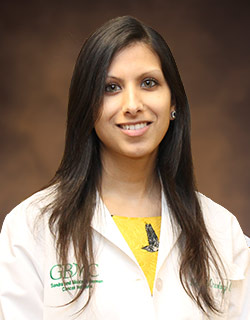Discussing Breast Cancer Treatment Options with Dr. Patel
October 25, 2017Breast cancer treatment isn't "one size fits all," and according to GBMC Radiation Oncologist, Dr. Kruti Patel, "treatment is patient-specific based on what we see in diagnosis, imaging, and surgery. There are clinical, physical, and individual factors that impact the treatment options."
In this segment, Dr. Patel discusses radiation oncology breast cancer treatment options with April Watts from Magic 95.9. Tune in as she shares vital information regarding breast cancer diagnosis and treatments, including recent advancements. Among the questions asked and answered are:
- At what age is it "safe" to stop or delay getting mammograms?
- Will I need both chemotherapy and radiation if I have breast cancer?
- How is radiation treatment delivered to patients?
-
Does radiation treatment make me radioactive?
- What are the common side effects of radiation treatment?
- Has there been an increase in radiation treatments? Are there other options?
- What if I have other health issues such as a prior stroke or diabetes?
- Will I have to change my diet or other lifestyle habits during treatment?
Dr. Patel also addresses intraoperative radiation therapy (IORT), where, during breast cancer surgery, radiation is given as a single dose directly to the area where the cancer was found. The patient may not need any further radiation treatment, but Dr. Patel does stress that "this option is offered to select, low-risk individuals at this time."
"Thanks to mammograms, we're catching breast cancer early, and we never want it to be you," says Dr. Patel. She emphasizes that success rates have improved, and "how we deliver treatments and reduce side effects continue to be ongoing challenges that we focus on."
While the exact treatment for breast cancer varies from person-to-person, listen to Dr. Patel share information on the guidelines used to help ensure high quality care and treatment.



